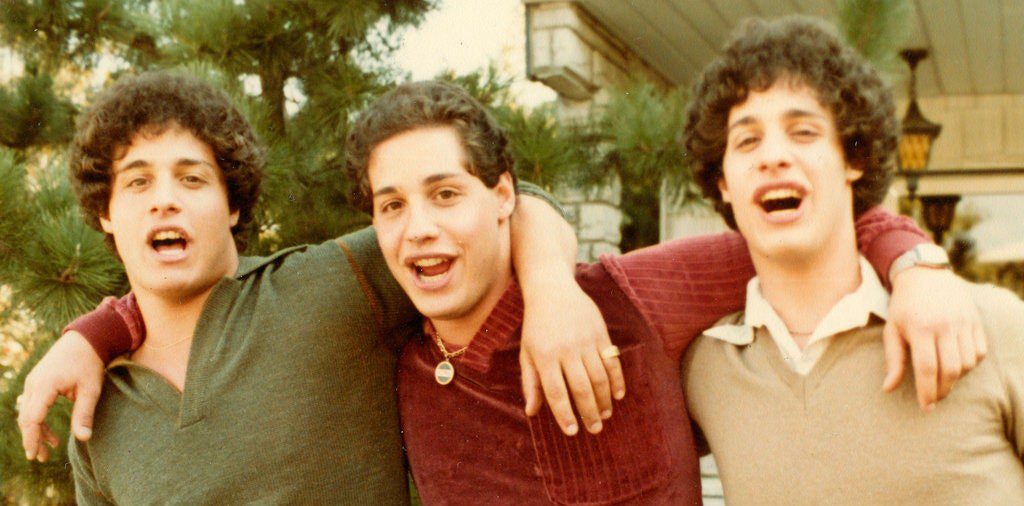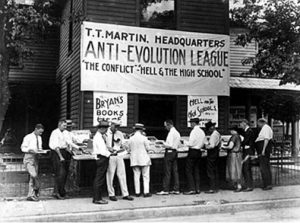Imagine moving into your dorm for the first time, and as you’re trying to get everything settled, several people you’ve never met greet you and call you by an unfamiliar name. Then suddenly somebody screams out that you have a twin. Well, as strange as that is, this exact scenario happened to Bobby Shafran in 1980. Bobby was moving into his dorm and was unfamiliar with the people at Sullivan Community College, in New York, but many of them greeted him and welcomed him back. However, things got strange when they began to call him “Eddy.” After much confusion, Michael, Eddy’s best friend, stepped in and began to ask him if he was adopted, and convinced him to drive to Eddy’s house. Upon arrival, the two long-lost brothers immediately conversed and hugged as if they had known each other their whole lives. Soon the story hit the New York Times, and everybody was in shock with the impossible situation.1 The story was incredibly hard to believe at the time, and it only got more confusing when David Kellman looked down at the newspaper and realized that he was staring down at two of himself. Immediately he called the other families and soon the three boys were reunited. The three families were so caught up with what seemed like a miracle that it was long until they questioned how these three boys got separated at birth back in 1961 by the Louise Wise Adoption Agency.2

Bobby, David, and Eddy at first weren’t occupied in finding out why the agency would separate them. On the other hand, their parents wanted to find out why, so all three families arranged a meeting with those working for the Louise Wise Adoption Agency. The meeting concluded nothing, as the agency only excused the incident by saying that they didn’t believe that a family would take in all three twins. With this simplistic answer, the three brothers continued to flourish in their new fame and seized every opportunity to be together. The boys quickly began to learn how similar their interests were and with the explosion of this news, many shows called them in for live interviews. Everybody was curious about them. They were asked if they had similar taste in food, cars, women, and mannerisms, to which they all answered yes. Bobby, David, and Eddy shared personality traits that amazed all the people watching them on television. In several interviews they revealed how all three had participated in wrestling in junior high and even smoked the same brand of cigarettes.3
When looking at triplets, the genetic makeup is distinctly different from regular siblings and fraternal twins. While fraternal twins only share fifty percent of their DNA code, triplets share one-hundred percent of their DNA code with each other. Identical twins are formed from the exact sperm and egg sharing the same DNA code that predisposes them to a lot of their psychical traits.4

In different studies, twins have been proven to be quite similar in both physical and personality traits. Psychologists had believed that this was due to twins being exposed to the same environment, allowing them to develop quite similarly. However, both nature and nurture contribute factors that predispose people to their personality. While nature deals with genetics, nurture focuses on environmental factors as impacts to one’s self. In this specific case, the triplets realized that heredity was influencing their personality. This can answer why Bobby, Eddy, and David looked exactly alike physically, but also shared many of the same interests, thoughts, mannerisms, and ideas. The idea of nurture was of little influence in this case, because the three brothers were identical in personality regardless of the different environments they were placed in at birth.5
Eddy, Bobby, and David had become so involved in each other’s lives, that they decided to open a restaurant called “Triplets” in New York. The brothers even decided to get an apartment together to make up for lost time. They had been getting along so well, and this only created a stronger bond between the three brothers. What used to be a dream quickly turned into a nightmare for the three men as they started to work together. As time passed, the three brother’s work ethics conflicted and they often had similar ideas for the restaurant. They recognized that not growing up together caused them to be unable to adjust to one another. After a lot of conflict, Bobby Shafran decided to leave the business, which caused a divide between the families. The three brothers eventually got married and Eddy relocated to stay near Bobby and David several times. However, the families we’re not as close, with only Eddy and David running the restaurant. Eddy began to act strange and revealed erratic behaviors, and he was admitted to a psychiatric ward. However, Eddy’s bipolar disorder only worsen, and he committed suicide in 1995. This event reveal that all three had once been admitted for psychiatric help, and it made them question more about the circumstances that had surrounded their birth.6
Eddy’s tragic death only fueled Bobby and David more to reach out to the Louise Wise Adoption Agency to figure out why they had been split up. The head psychiatrist Dr. Peter worked for the Louise Wise Adoption Agency and purposefully orchestrated the separation of not only these three brothers, but other set of twins as well. Dr. Peter oversaw a study on Nature vs Nurture in twins, and gathered several assistants to help conduct it.7 Although many records weren’t released, Bobby had gotten in contact with the assistants in the experiment after many attempts to receive the documents that were sealed off in Yale University. Lawrence Perlman, Dr. Peter’s assistant, revealed that the agency had tried to see the impact of the differences in parenting and in social class on twin personalities. Dr. Peter placed Bobby with a wealthy family, Eddy with a middle class family, and David with a blue-collar family. The research assistants had gone to their homes as they grew up to test what heritable traits they shared in their controlled environments. Dr. Peter’s assistants would also test the boys’ intelligence, emotions, and picture descriptions, and as they grew older, the examinations would become more complex. They had also chosen them carefully to all live within a hundred-mile radius from each other in order to follow up with the children for several years. The study made Bobby and David feel like guinea pigs, and it crossed a lot of personal boundaries that should have been illegal at the time. The assistants disagreed, because at the time the boundaries for scientific research were not greatly restricted.8

Although psychology had been a respectable discipline since the nineteenth century, Social Psychology was coming into its own in the late 1950s and early 1960s. Many psychologists had conducted experiments regarding human nature and the factors that influence personality. At that time, researchers still didn’t have regulations for their experiments. Over time, the American Psychological Association (APA) has established limits and preventions to avoid unethical experiments after continuous disregard for participant awareness.9 The APA’s ethical guidelines mentions debriefing, which is the first step a researcher must take before he or she can construct experimental groups. Debriefing consists of researchers explaining the nature of their experiment to the participants and then allowing them to choose whether they wish to remain a part of the experiment. After the debriefing process, it is also required that researchers explain the confidentiality of the experiment and the role the participants will take. Once the research is conducted, participants get called in to discuss the results or any deceiving, if any, that took place during the experiment.10
The era when the three brothers were born was a time when scientific research in social psychology was still in its unmonitored and undisciplined stage. The assistants in the research conducted by Dr. Peter didn’t feel regret for what they had participated in, even though they later admitted that it was unethical. There was a lot to uncover about the impact of genetics on personality that was tested without much ethical control during the 1950s and 1960s. Overall, the study had concluded that genetics played a huge role on the development of the three brothers, and that mental illness can also be inherited and displayed, regardless of parental involvement or social class. This was one of many experiments that paved the way for the APA’s implementations of ethic standards for scientific experiments.11 But Bobby, David, and Eddy felt used and didn’t accept the excuse for their treatment. Their whole lives were treated as a huge experiment, and it was only a mere coincidence that the three brothers had crossed paths in 1980. After Eddy’s passing, Bobby and David were able to find closure by receiving all the documents from the agency over the experiment. Bobby and David continued their life’s alongside their families after all the tragic news, but later agreed to make a documentary to bring awareness to the issue.
- Emma Shackle, “Three Identical Strangers,” Transpersonal psychology review, (2019): 58-59. ↵
- Leon Hoffman, “Three Identical Strangers and The Twinning Reaction,” The Arts and Medicine, (2019): 10-12. ↵
- Emma Shackle, “Three Identical Strangers,” Transpersonal psychology review, (2019): 58-59. ↵
- Bryanna Moore, “The Strange Tale of Three identical Strangers: Cinematic Lessons in Bioethics,” The Hastings Center Report, (2019): 21. ↵
- Victoria Stern, “Roundup: Nature vs Nurture,” Scientific American Mind, (2014): 73. ↵
- Charlie Brouillard, “Predictive Links Between Genetic Vulnerability to Depression and Trajectories of Warmth and Conflict in the Mother-Adolescent and Father-Adolescent Relationships,” Developmental Psychology, (2019): 1743-1746. ↵
- Emma Shackle, “Three Identical Strangers,” Transpersonal psychology review, (2019): 58-59. ↵
- Leon Hoffman, “Three Identical Strangers and The Twinning Reaction,” The Arts and Medicine, (2019): 10-12. ↵
- Franklin Miller, “Forgoing Debriefing in Deceptive Research: is it ever ethical?” Ethics and Behavior, (2013): 105. ↵
- Malgorzata Oczak, “Debriefing in Deceptive Research: A Proposed New Procedure,” The Journal of Empirical Research on Human Research Ethics: An International Journal, (2007): 49-59. ↵
- Malgorzata Oczak, “Debriefing in Deceptive Research: A Proposed New Procedure,” The Journal of Empirical Research on Human Research Ethics: An International Journal, (2007): 49-59. ↵



71 comments
Makayla Soto
As a biology minor this was something definitely interesting to read and understand! I also appreciate the pictures you provided in the article with the different DNA strands of fraternal twins and identical twins. This was a well written article and so informative as well! I learned a lot from the article and the amount if information you provided. Such a good job!
Ana Barrientos
First of all, great article, it was informative and well structured. I had no idea that triplets share 100% of their DNA code with each other, that was really interesting to read about. When I was in high school, in my psychology class we were discussing nature vs nurture and that’s when our teacher talked about the “Triplets”. To me the experiment was wrong, and it was not right to separate them from each other. It just didn’t make sense at all, but I am glad that the 2 brothers are now spreading awareness about unethical experiments.
Victorianna Mejia
Wow. Before reading this article, I had no idea this had happened to twins and triplets. I could not even imagine if I had a twin and was separated from them for research for Nature v Nurture experiments. Eddy, Bobby, and David are all in their right to feel used. It was sad to read that Eddy committed suicide; it makes me wonder if they weren’t separated at birth if they could have avoided his death? Great article!
Dylan Vargas
The article gives us the story about the Three triplets which I like. How the two met in college and how the third one found out from a newspaper article, is a nice way to bring them together. I also like how it started to go into the Biological explanation, Nature and Nurture, and how they are similar and why they are similar. The entire article gives a good perspective on the biological side of DNA and the chances of this happening while also telling the story of the three triplets.
Andrea Ramirez
This is a really intriguing article. The case of Bobby, David, and Eddy looks like something out of a movie.
I found it very interesting that even though the three of them grew up in different environments, they were identical in personality. I have a twin and, to tell the truth, we have many similar tastes. Likewise, I believed that this was mainly due to growing up in the same context, but I was able to realize that genetics had a great influence.
In general, I really think that this was an unethical experiment in using the lives of these triplets as an experiment.
Irene Urbina
A few months ago, I saw the documentary on Netflix about this case and was immediately intrigued by it. It is so sad that the triplets lost the chance to grow up together just because of an experiment. If that had not happened, their story probably would have ended differently. I am glad that they decided to make a documentary on this part of their lives to raise awareness on unethical studies. I really like how this article also explained psychological terms and how studies worked and were regulated at that time.
Elizabeth Saxon
This is a very interesting story that I have never heard of. I have a lot of twins in my family but never realized how similar but so different triplets can be than twins. This story was a great way for psychologists to perform research on ethics. Being separated from your three brothers then later finding them in life is something that seems nearly impossible. Situations like this put into perspective how someone’s upbringing can affect them. I’m glad Bobby and David were able to get closure and spread awareness of the issue.
Erika Longoria
This article was so mind blowing and interesting to read! I have heard about these triplets and them being apart of an experiment, but never understood the whole case. The fact that all three brothers were separated, had no idea about each other, and somehow managed to return back in each others lives is crazy. Now a days, we know that some illnesses and diseases are hereditary based on our genes, but back then they had to perform social experiments to learn more about whether different factors have an effect on hereditary traits or not.
Perla Ramirez
Its very interesting how they separated triplets at birth and they were an experiment without them knowing until they met, got together, opened a restaurant, arguing, mental health issues resulting in one committing suicide. Which rose red flags to the triplets and wanting to find out why they did what they did. The experimenters had no remorse as to what they did and thought it was completely okay to do something like that but now there are ethic laws which prevents something like this happening again.
Eliana Villarreal
This case was incredible to read about! It really was a learning process for the psychology world as they were still developing ethical ways to conduct research. This helped scientists learn the rights and wrongs of ethics in experimentation. It’s unfortunate for any siblings to be split apart at such a young age, but I am glad they were able to reunite after so many years. I also had no idea that triplets share 100% of their DNA makeup. I found that immensely interesting! Overall, this was an unfortunate case that was proved to be unethical and I am glad the remaining brothers made it a point to raise awareness about unethical experimentation after enduring all that they did.